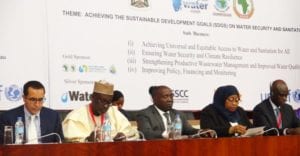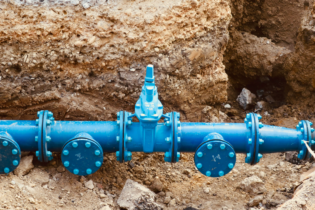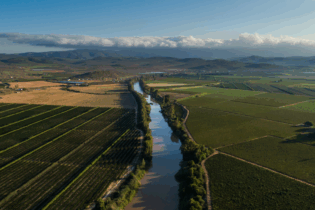
General Assembly of the African Ministers’ Council on Water, 21 July 2016 – From left to right: Mohamed El Azizi, Water and Sanitation Director, AfDB; Suleiman Adamu, Minister for Water Resources, Nigeria; Gerson H. Lwenge, Minister for Water and Irrigation, Tanzania; Samia Suluhu Hassan, Vice President, Tanzania; Amadou Mansour Faye, Minister for Hydraulic & Sanitation, Senegal. Photo: AfDB
Participants also tried to develop a common understanding of policy design options and financing requirements for practical implementation of climate change resilience projects.
“Getting the right design is critical for financing of any infrastructure. Key design parameters for water infrastructure are hydrological information. In many countries this information is weak and the uncertainties introduced by climate change make projections even more difficult. A new program Hydromet can support better information for design in climate resilient infrastructure,” said Jean-Michel Ossete, Acting Coordinator, African Water Facility.“To meet SDG6 targets in Africa, realistic and comprehensive financing plans are needed based on the costs of providing both hardware and software components as well as operations and maintenance to ensure services operate efficiently and sustainably,” added Jochen Rudolph, water and sanitation expert at the AfDB.AWW6 was also an opportunity to explore and identify opportunities for linkages and collaboration across global, regional, and sub-regional monitoring initiatives in order to better track progress on SDG6. Innovative ideas have also emerged. “The AWW discussed new approaches to complement traditional mechanisms of water financing through establishing links with different actors in the African water domain, such as tourism and the private sector,” said Ahmed Tarek, from the African Natural Resources Center, AfDB. The Bank’s delegation to AWW6 also seized the opportunity to explain how AfDB’s top five priorities or “High 5s” as well as its climate finance strategies can help accelerate the attainment of SDGs. The main recommendations and resolutions of the 6th AWW will be summarised in the Dar es Salaam Roadmap to achieve Water Security and Sanitation in Africa, which will be adopted by the African water ministers.






